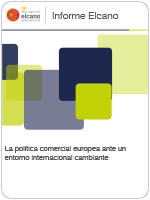Both the nature of international trade and its governance have changed a lot in recent years. International exchanges are increasingly structured in value chains while services trade is gaining prominence. At the same time, the arrival of Donald Trump to the White House, his trade wars and the attitude of an increasingly assertive China, is eroding leaps and bounds the multilateral frameworks of international trade governance and opening the door to commercial and technological wars. In this new context, the EU is forced to redefine its commercial strategy and improve its tools to compensate and empower the losers of openness in order to increase the legitimacy of liberalization.
This report states that the EU must coalesce internally, increase the legitimacy of economic openness in the eyes of its citizens and act as a homogeneous block capable of leading the reform of the rules-based multilateral order. In parallel, it must continue to weave its network of preferential trade agreements to be prepared for an eventual – today possible – collapse of the multilateral system embedded in the World Trade Organization (WTO), as well as for a division of the world economy into blocks within A neo-imperialist logic.
Spanish version: La política comercial europea ante un entorno internacional cambiante.


